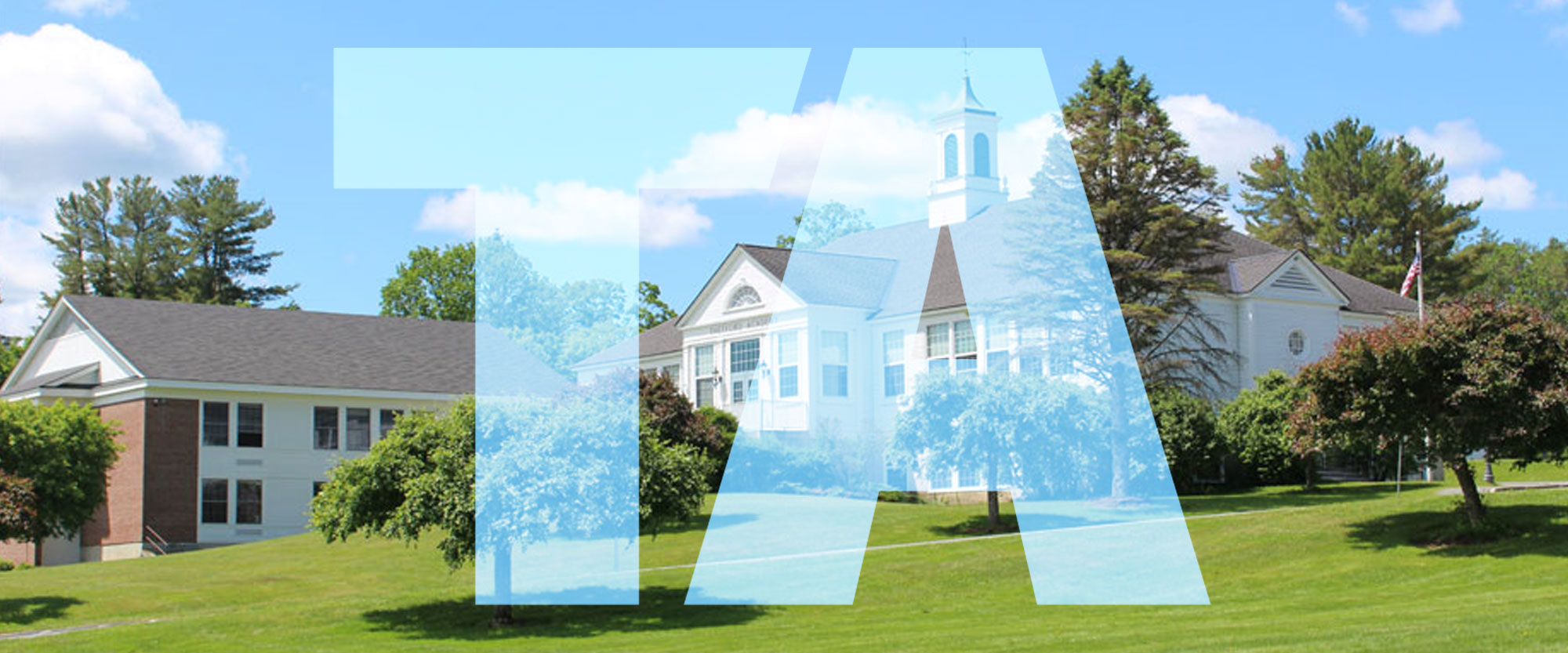Academic Courses
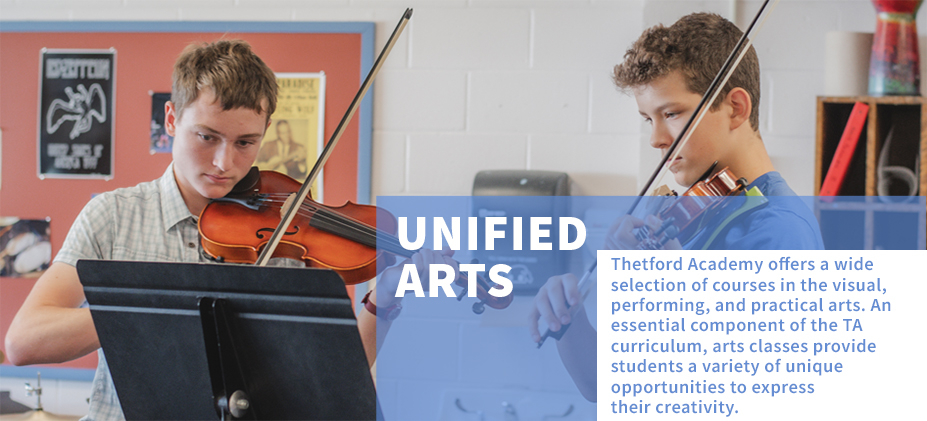
Visual Arts
The Visual Arts program at Thetford Academy focuses on visual literacy. How do color, contrast, value, shape, pattern, and quality of line affect the way one reacts to a visual presentation—either in life or on canvas? And in the studio, how does one employ elements and principles of design to portray creative ideas? Visual Arts students learn how art theory and methods are employed toward skillful creative expression. Students work both individually and collaboratively, learning the valuable disciplines of effective critique and collaboration, while also discovering and evolving their own style.
Middle School Art
Grade 7–8 | Arts Rotation
In grade 7, students create artwork in conjunction with an informal introduction to art theory, art materials, and foundational artistic skills. Projects such as color wheels, posters, and brain- teasing designs allow students to put theories into use. All assignments are designed to inspire students’ creativity and may include drawing, printmaking, and sculpture.
In grade 8, students paint landscapes and posters, sculpt in clay or papier mâché, and draw from observation and imagination. Students will learn how to give a sense of three dimensions or depth to their paintings and drawings, draw figures from life, and create multi-media compositions. Using architecture as a theme, they will also explore the rules of linear perspective in imaginative ways.
Art 1
Grade 9–12 | Credit: 1/2
Art I is an introductory exploration of art materials and methods, with an emphasis on learning technique and employing this knowledge as a tool for personal expression. Students experiment with various media including, but not limited to, pencil, ink, paint, collage, and relief sculpture. The focus on developing technical skill culminates with the fun and challenging tradition of drawing Thetford Academy’s hallways in the linear perspective assignment.
Expressive Drawing and Printmaking
Grade 9–12 | Credit: 1
Using various drawing media such as pencil, charcoal, ink, and non-traditional materials, this semester-long course explores in depth the possibilities of mark-making as personal expression. Emphasizing skill development through accurate drawing from observation, students will focus on still life, figures, and self-portraiture. Students will also use their honed skills for drawing from the imagination and for conceptual work. Experimentation with various printmaking techniques is the focus of the second half of the course. The students will work toward creating a series of prints expressing their interest in a particular subject.
Ceramics: Hand Building & Wheel Throwing
Grade 9–12 | Credit: 1
This course introduces students to working in three dimensions through the medium of clay. Students will learn hand building and wheel throwing techniques in creating both functional and sculptural pieces, including coil, slab, pinch, and working on the wheel. Surface carving and decoration will also be explored, as well as texture and color, through the use of ceramic glaze. Overarching questions threading through the course are: “Where does the balance exist between form and function in the creation of ceramic art?” and “What is the role of craftsmanship in ceramics?”
Painting
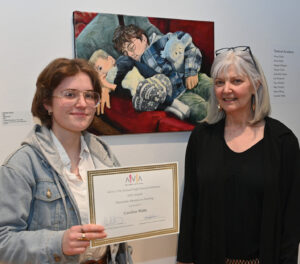 Grade 10–12 | Credit: 1
Grade 10–12 | Credit: 1
The painting class is designed for students wanting a more focused exploration into traditional painting techniques, as well as more thinking outside the rectangle. Painting class challenges students to combine technical skills with experimentation to develop their visual voice. Emphasis is on the technical qualities of various painting media, (acrylic, watercolor, pastel), as well as the exploration of color theory in order to understand and use color in a personally expressive way.
Prerequisite: Ceramics or Expressive Drawing and Printmaking
Advanced Art
Grade 11–12 | Credit: 1
 The Advanced Art course is designed for the serious and self-motivated art student. Students develop a series of independent works based on a concentrated area of study such as pottery, acrylic painting, printmaking, or other media the student chooses to explore in depth.
The Advanced Art course is designed for the serious and self-motivated art student. Students develop a series of independent works based on a concentrated area of study such as pottery, acrylic painting, printmaking, or other media the student chooses to explore in depth.
Students are encouraged to explore and experiment with different themes and media, and will often participate in classroom skill- building exercises, and may elect to cooperate in guided service-learning projects such as The Memory Project. A class climate of mutual support and respect is emphasized through regular class critique. Writing a research paper and completing artwork outside of class are requirements of this course. This course may conclude with a public exhibition.
Prerequisite: Must have taken a previous visual arts course with a grade of A.
Photography
Grade 11–12 | Credit: 1
This class is an introduction to digital photography that will culminate in a finished photography book with no fewer than twenty pictures. We will cover selected areas of photographic history as well as focus on contemporary photographers. Classes will include: in class assignments, lectures, critiques, group discussions, student presentations, book design, and independent research. Students will learn how to control camera techniques: settings, editing, filtering, and printing. As a starting point, we will explore three different introductory photography topics: landscape, still life, and portrait. Students will be expected to learn from lectures, conduct independent research, and perform an artist presentation of a chosen photographer from these categories.
Design Technology
The Design Technology program at TA introduces students to the design and manufacturing process and emphasizes hands-on learning in a collaborative setting. Introductory courses focus on the fundamentals of woodworking, metal fabrication, jewelry making, and introduce students to three-dimensional design software and the computer aided design and manufacturing process. Many students go on to take advanced classes where they design and build more significant projects, such as furniture, musical instruments, metal sculptures, and small buildings.
Middle School Design Technology
Grade 7–8 | Arts Rotation
This course introduces students to basic woodworking techniques, wire jewelry making, and wood turning. Emphasis is on the proper use of hand tools, principles of design, appreciation for fine craftsmanship, and shop safety. Students learn to use SketchUp as a three dimensional design software, and use computer numeric controlled machines to embellish their work. Student projects are often displayed at the end of the term.
Design Technology I: Technology for the 21st Century
Grade 9–12 | Credit: 1/2 or 1 
This course is designed for beginning Design Tech students who may or may not have any previous experience in Design Tech. The course helps students gain knowledge and skill using a variety of hand tools and power machinery including the table saw, surface planer, wood lathe, and welding equipment. Students are also introduced to the computer aided design and manufacturing process. Students complete individualized projects in woodworking, wood turning, jewelry making, and metal work.
Design Technology II
Grade 10–12 | Credit: 1/2 or 1
This course is designed for those students who want to pursue additional studies in one or more areas of design technology. Students are required to utilize computer aided design and manufacturing when appropriate.
Prerequisite: Successful completion of Design Tech I with a minimum grade of B and demonstration of ability to work safely in the shop.
Note: This semester-long course may be taken for a half block or a full block.
Computer Graphic Design
Grade 9–12 | Credit: 1/2
This course introduces students to computer graphic design, emphasizing the fundamental elements and principles of design and following the National Standards for the Arts. Engaging in the design process, students learn to interpret a design brief, prepare sketches and initial drafts, incorporate client feedback, and follow through with a finished project. Students are introduced to several software programs as they start to design and lay out projects, which might include posters for their class dances; logos, signs, social media posts, etc. for local companies, style guides, media brochures, or other real-world design tasks. Students prepare a portfolio of their work for display at the Arts Night in May. Written reflections accompany each project. While homework is minimal, this course requires student motivation, perseverance, and self-reliance.
Timber Framing
Grade 10–12 | Credit: 1 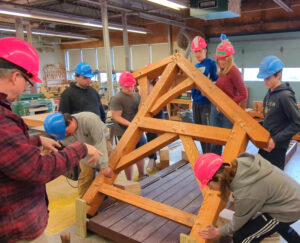
Students collaborate to design a timber- framed structure, complete with a scale model, site plan, engineering calculations, brief environmental impact statement, timeline, and budget. They then cut the frame in the workshop, raise the frame on site, and contribute towards the completion of the structure. Readings, math work, and other traditional assignments supplement the hands-on learning. Homework may include spending time outside class hours contributing to the project after school or on weekends.
Yearbook
Grades 9-12 | Credit: 1/2 or 1
The Yearbook class meets for a half block both semesters; students can enroll for one or both semesters. In this course students create and publish the annual TA yearbook. Students learn the fundamentals of layout and design, photography, journalistic writing, and copy editing. Students need to work independently and collaboratively and take initiative to be productive and meet deadlines in this product-driven class. The students will produce a high quality yearbook publication to be distributed to the student body.
Drama
The Drama program at Thetford Academy offers students varied opportunities to explore the theater arts. Drama production is the assembling of people and things in a delicate balance of believability, in order to bring the artistic creation of a playwright to life. Theater can open up a fascinating world in which students may find opportunities to exercise their drives for self expression and creativity.
Middle School Drama
Grade 7–8 | Arts Rotation
This course focuses on improvisation and the fundamentals of acting technique. The class begins with improv games and evolves to individual character development. Students learn to use aspects of voice and movement to enhance a role, and are introduced to theater vocabulary. The class culminates with the performance of a short, selected piece.
Fall Play and Ten Minute Plays
Grade 9–12 | Credit: 1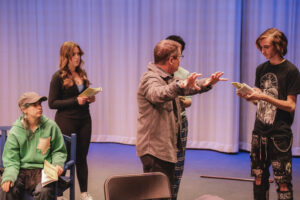
The first half of this theater course is devoted to the production and performance of a full-length play, with auditions held during the first week of classes. In the second half of the semester, students produce a variety of ten-minute plays, and have opportunities for both acting and directing. Students choosing tech roles will develop hands-on experience creating the technical elements of theatrical production, from set construction and painting, to lighting design and sound. Students only interested in tech roles should seek prior approval of the instructor before registering for the course.
Musical Theater
Grade 9–12 (7-8 with permission) | Credit: 1
Musical Theater, offered during the second semester, is devoted to the production and performance of TA’s annual spring musical. Students in the course are engaged in all aspects of the musical’s production and have opportunities to act, direct, choreograph, create props and costumes, design and build sets, learn lighting and sound tech, and work on the show’s publicity. The final performance takes place each year in May. Note that while much of the rehearsal process occurs during class time, some rehearsals may be required after school and on the weekends.
One Act Play Competition and Playwriting
Grade 9-12 | Credit: 1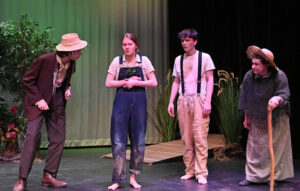
The first half of this class is devoted to the production of a one–act play for entry in the The first half of this class is devoted to the production of a one–act play for entry in the Vermont Drama Festival in March. Two plays from each regional festival will be selected to compete in the State Finals. The One Act festival offers students the opportunity to experience excellent drama by attending multiple shows and interacting with students from other schools throughout the state. One-Act students study the principles of acting, from character analysis to improvisation. They also gain a working knowledge of the technical aspects of theater. The second half of the course is dedicated to learning the craft of playwriting. Students will explore the different forms of dramatic expression. Students will draft, revise, rehearse, and perform short plays as a culminating course project.
Music
Music is a form of aural expression, its impact upon us can be instantly and profoundly experienced. Music reaches across time and influences us regardless of our differences. Recognizing that music is an effective communicator, provides great joy to both performer and listener, and brings people together, the Thetford Academy Music Department ensures that students:
- Learn to use music to express what they understand and experience about their world, and to realize and respect what others have said about theirs;
- Recognize that working together in a cooperative, caring atmosphere fosters positive results;
- Develop an awareness of the musical concepts of pitch, melody, harmony, rhythm, meter, timbre, and form through participation in various performing ensembles, private and small group lessons, and general music activities;
- Take responsibility for attending class regularly and arriving ready to work, as attendance, work attitude, effort, and commitment are important to achieving the best possible product.
All music classes are semester-long. Under extenuating circumstances, qualified high school students may join classes for the second or fourth quarter with permission from the instructor.
INSTRUMENTAL MUSIC
Beginning Instruments
Grade 7–8 | Arts Rotation
This course is designed for students with little or no musical experience, and serves as an introduction to playing a musical instrument. Students in the course learn proper playing techniques, music reading skills, how to perform as part of an ensemble, and appropriate care of their instruments. Students perform publicly.
Instrumental Ensembles
Grade 9–12 | Credit: 1/2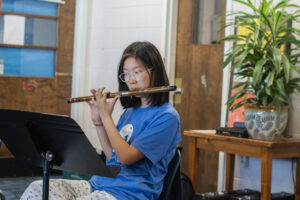
Instrumental Ensembles meets daily for a half block and performs concerts in December and May and at assemblies throughout the school year. Concert attendance is mandatory and is part of the student’s grade for the course.
Students enrolled in Instrumental Ensembles learn proper instrumental technique, sight reading skills, basic music theory and its application to their instrument, basic improvisation skills, effective practice and rehearsal techniques, and perform as an ensemble music from a variety of genres. Students who need instruments should consider renting or purchasing from a local dealership. If needed, Thetford Academy also has several band instruments available for use.
Stage Band
Grade 9–12 | Credit: ½ or 1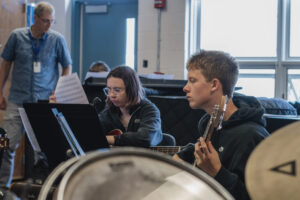
Stage Band is an upper-level ensemble class for high-school students who are able to read music. The stage band meets daily and performs for multiple events throughout the semester including concerts in December and May. Students enrolled in Stage Band learn and perform music from a variety of genres, learn theoretical concepts in relation to their instruments and the music they are performing, and utilize specific practice techniques to develop their craft. This class also introduces students to essential skills necessary for effective improvisation. They perform and analyze transcribed solos as well as create their own.
Note: Entry to the class is by audition or teacher permission.
Middle School Chorus
Grade 7–8 | Arts Rotation
Choral Music provides training and performance opportunities for all interested students. The course explores music from a variety of eras, styles, and cultures and teaches students the basics of how to follow choral scores and read music. Students in Choral Music work together to create a bright, expressive choral sound and unified ensemble. During this quarterly course, students will be introduced to the foundational elements of choral ensemble singing: proper breathing, healthy vocal production, blend and balance, expansion of range, good intonation, ear training, and sight-reading. Students will study a variety of musical styles and work as an ensemble to perform and share music with friends, family, and the community. The class culminates in a final performance, as part of the Winter Arts Concert or Spring Arts Expo. The chorus may be called upon to perform at various Thetford Academy assemblies/events throughout the school year.
Chorus
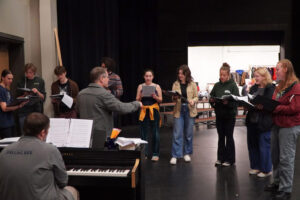 Grade 9–12 | Credit: 1/2
Grade 9–12 | Credit: 1/2
Chorus provides students the following musical skills for ensemble singing: proper breathing, healthy vocal production, blend and balance, expansion of range, good intonation, ear training, and sight-reading. This course is designed to help students achieve greater vocal independence, confidence, inner hearing, and quality tonal production. Students will study a variety of musical styles and work as an ensemble to perform and share music with friends, family, and the community. Students will memorize their music and follow conductor cues. Through group exercises, individual practice, demonstrations, and warm-ups students will become more comfortable in their vocal range, focus on proper breathing, and blending pitch. Each student experiences a unique and positive atmosphere in which they learn to be a better performer. The class culminates in a final performance, as part of the Winter Arts Concert or the Spring Arts Expo. The chorus may be called upon to perform at various Thetford Academy events throughout the school year.
Culinary Arts
Culinary Arts courses address multiple skills, including food preparation, nutritional health, consumer skills, and time management. Food courses concentrate on the fundamental cooking skills used in everyday life, such as reducing recipes, kitchen safety, and sanitation. Students may also learn budgeting and consumer skills: unit pricing, comparison shopping, and time management strategies. Culinary courses offer practical applications for traditional academics. For example, by using reading comprehension skills to decipher a recipe, math skills to alter quantities, or the scientific method to modify recipes, Culinary Arts students are building transferable skills that can be used across the curriculum.
Introduction to Cooking
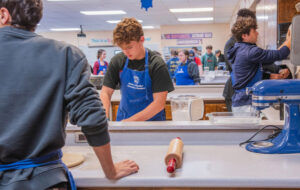 Grade 7–8 | Arts Rotation
Grade 7–8 | Arts Rotation
Introduction to Cooking is a middle school elective designed for hands-on learning. The course explores the fundamentals of standard cooking procedures, vocabulary, and measurement. Students work through a variety of recipes, including simple entrees, breakfast foods, and desserts, with weekly selections reflecting students’ growing skills and efficiency.
Cooking for Health
Grade 9–12 | Credit: 1
Cooking for Health is an experiential learning course. Students practice cooking skills and also take-on service learning projects. We begin the course in the school’s garden: harvesting, processing, and canning or freezing the produce. Students also enjoying these fresh whole foods making zucchini bread, carrot cake, or homemade spaghetti sauce. Other service learning targets food insecurity in our community. Projects include: offering a la carte items in the school cafe, food donations for the Thetford Food Shelf and the Thetford Elder Network and fundraising with the Empty Bowl Project. Cooking labs allow students to gain confidence in the kitchen and an opportunity to try meals made from scratch with whole ingredients that boost nutritional health.
Meal Planning and Preparation
 Grade 9–12 | Credit: 1
Grade 9–12 | Credit: 1
Meal Planning and Preparation offers students opportunities to develop cooking skills and confidence. Students practice standard cooking techniques and are introduced to more advanced culinary methods. The textbook, Guide to Good Food, offers a survey of basic cooking methods, ingredient specific techniques, common dilemmas, and best practices. Students will cook two to three times per week, gaining kitchen confidence and skills.
Foods Around the World
Grade 9–12 | Credit: 1
Introducing new flavors and trying new foods is a unique classroom adventure in Foods Around the World. Students select, prepare, and share foods from a wide variety of countries and cultures. In each unit, students dive deeper into a culture’s recipes, comparing regional crops with diet profiles and customs. The unique spices of each region serves to identify many ethnic foods. While exploring a cuisine, students are introduced to basic and intermediate cooking techniques, culinary vocabulary, and measurements. Regular cooking labs allow students to develop their skills. The course features “banquets” highlighting each unit with student-prepared dishes and emphasizing ethnic blends of spices, form, appeal, and presentation.
Pastries
Grade 9–12 | Credit: 1
Pastries offers students the opportunity to create a variety of pastry shop delicacies including: éclairs, napoleons, palmiers, croissants, Danish pastries, tarts, tortes, artisan cakes, and cookies. Students learn the secrets of flaky and buttery crusts, rich and creamy fillings, and light, airy pâte à choux. This course introduces the techniques for cutting and folding in butter to make laminated dough and blitz puff pastry. Students learn about form, symmetry, appeal, and presentation. This course satisfies the graduation requirement in the Arts.
Food Science
 Grade 9–12 | Credit: 1
Grade 9–12 | Credit: 1
The Food Science course uses common food ingredients to explore scientific concepts. Throughout the course, students will participate in laboratory food experiments, using the scientific method to explore science concepts. Cooking offers ample opportunities to investigate chemical and physical changes, acid and base reactions, phase changes, heat transfer and more. For example, jams, pickles, beef jerky, ice cream, and bread all offer a platform to study science. Lab reports, including observations, data calculations and conclusions allow students to reflect on scientific concepts while developing critical thinking and reporting skills. After successfully completing Food Science, students will have an introductory understanding of basic chemistry.
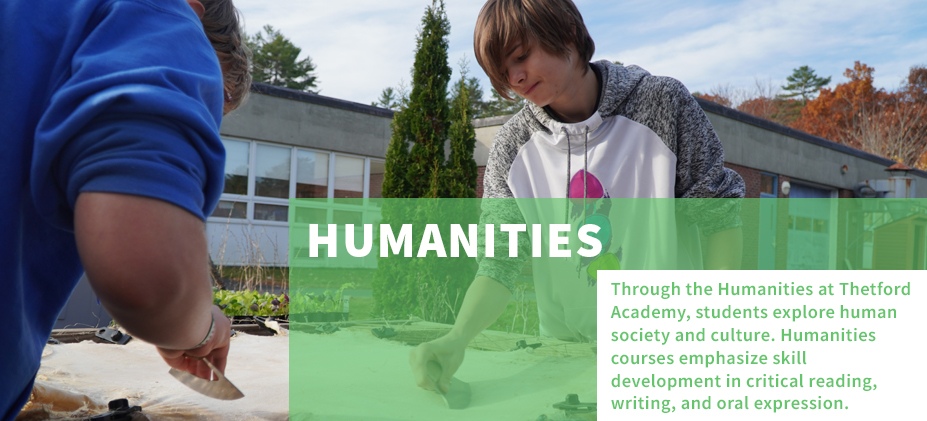
English
In the English Department, students work to achieve competence and aim for excellence in the areas of reading, writing, speaking, listening, and reasoning. Core English courses are required for students in grades 7–10; one credit of English is required each year through grade 12. Students can choose from a wide range of English electives and are encouraged to take additional courses beyond the required curriculum.
ENGLISH REQUIRED COURSES
English 7
Grade 7 | Required
The goal of English 7 is to meet standards of participation in a literate community by talking about books, ideas, and writing. Students
accomplish this through reading and writing workshops; in addition, they practice grammar and vocabulary skills. Discussions and writing assignments are designed to help students make connections between their own experiences and the readings. Titles may include: Nothing but the Truth, Day of Tears, The Outsiders, Diary of Anne Frank, and Ghost Boys. Students use the writing process and write “Response to Literature” essays, a personal essay, a persuasive essay, poetry, and other creative pieces.
English 8
Grade 8 | Required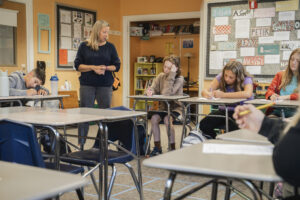
This course builds on the foundational skills developed in English 7, focusing on reading, writing, and oral communication. Students explore the yearlong essential question, “What makes for effective and compelling stories?,” through a variety of texts, including A Long Walk to Water by Linda Sue Park, Shakespeare’s Macbeth, choice books for literature circles, and selected short stories, poems, and informational texts. Writing assignments include personal essays, response-text essays, narratives, poetry, and writing for the ear through audio stories and interviews.
English 9
Grade 9 (Required) | Credit: 1
This course is designed to establish a common knowledge of as well as strengthen students’ academic literacy skills essential to success in high school, including reading, writing, and reflection. Participating in the course’s literate community and sharing ideas and work with others helps students develop both expressive and collaborative skills. Students explore themes of coming of age, respecting differences, human dignity, and justice, with a focus on how stories shape our world. Students read The Someday Birds, The Hate U Give, and Gather. Students write personal responses, response-to-text essays, creative pieces, and other assignments as time and interest allow. This course includes an embedded honors option.
English 10: Identity and Voice
Grade 10 (Required) | Credit: 1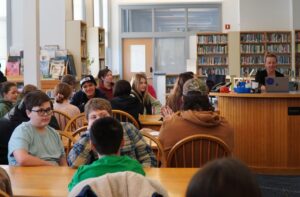
In English 10, students read Sandra Cisneros’s The House on Mango Street and Emily Bernard’s Black is the Body: Stories from My Grandmother’s Time, My Mother’s Time, and Mine, and Shakespeare’s Romeo and Juliet. In addition, students study contemporary plays, poems, and a “Book Group” novel they choose from a list of offerings. Students write responses to literature, personal essays, poetry, and vignettes. The course asks students to explore their own sense of identity and voice as readers and writers. “The Anthology Project,” a TA tradition, highlights this exploration. Students collect excerpts of both original and published literature that feel important to them—citing all sources and exhibiting their own artistic touch. To cap off the project, students formally present their anthologies to an audience. This course includes an embedded honors option.
ENGLISH ELECTIVE COURSES
Creative Writing
Grade 11–12 | Credit: 1
For students who love literature and want to create their own, this course explores crafting poetry, creative nonfiction, fiction, and personal essays. For inspiration, students draw upon powerful texts old and new, art, music, and nature, as well as workshops led by local authors. Students frequently read their work aloud to each other during class. Grammar and vocabulary are regular components of study; woven into the examination of rules and definitions is a consideration for how writers control the reader’s experience by the punctuation, grammar, and words they choose. As a culminating project, students present a sampling of their work to an audience in the theater. Reading one’s work aloud is a requirement of this course.
World Literature
Grade 11–12 | Credit: 1
World Literature gives students an opportunity to expand their global cultural awareness by examining literary perspectives and traditions through the work of non-American writers. This study provides opportunities for dynamic discussion and a deeper understanding of other cultures. The course explores questions such as: How does where we come from impact who we are or who we become? What is the relationship between one’s personal experience and one’s cultural perspective? How does literature reflect the culture? Readings include global selections such as Achebe’s Things Fall Apart, Dai Sijie’s Balzac and The Little Chinese Seamstress, and Camus’s The Stranger. Writing assignments to include informational pieces, narratives, journal entries, and poetry. This course includes an embedded honors option.
Science Fiction
Grade 11–12 | Credit: 1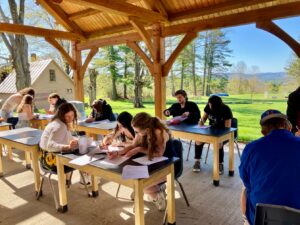
This course explores speculative fiction through the wide genre of science fiction, including novels, short stories, films, and games. Students examine how more fantastical worlds and concepts still allow us to explore themes and anxieties present in our current culture, as well as strengthen both creative and analytical skills through essays, presentations, and short stories. Works studied include Hitchhiker’s Guide to the Galaxy, Do Androids Dream of Electric Sheep?, To Be Taught, if Fortunate, and short stories by Ray Bradbury.
Civil Rights Literature
Grade 11–12 | Credit: 1
The class explores the history of what is often called the “Classic Civil Rights Movement” by examining the literature of that period, as well as the literature about that period that has been published more recently. There is also an emphasis on current events as they relate to civil rights and racial justice. Course texts include a wide range of fiction and non-fiction, including (but not limited to) speeches, poetry, novels, short stories, news articles, and movies. Students will write traditional essays, as well as creative compositions. By exploring the major milestones and markers of the Civil Rights Movements, the course aims to provide students a foundational understanding of the events themselves and the associated literature. This course includes an embedded honors option.
Senior English Seminar—Honors
Grade 11–12 | Credit: 1
The primary goal of Senior English Seminar—Honors at Thetford Academy is for students to develop their abilities as writers and independent critical readers. In this college-level course, seniors read and study selections from some of the best writings of American and world literature—books, plays, poetry, and short stories. The writing component includes personal responses and analytical essays about literature. Honors American Literature is for those seniors with an exceptional interest in literature and writing who are willing to work hard at both.
Prerequisite: Summer reading and writing are mandatory for this course; the assignments may be picked up during the last week of May.
Human Nature in Literature—Honors
Grade 11–12 | Credit: 1
Because students in this course read literature with challenging, unconventional structures, and because they push beyond their current achievements when they write about this literature, the subtitle of this course is “Breaking Boundaries.” The writing focus is on responses to text, specifically clarity of purpose. Students work on choosing apt quotes as evidence as well as crafting dynamic introductions and solid conclusions. This work prepares students for Honors American Literature, college applications, college courses, and…life! After all, being able to make an argument backed up by relevant evidence is a useful skill. In addition, students write poetry and creative non-fiction. Vocabulary study is a weekly component of the course, and students also take an in-depth look at how grammar affects writing style and voice. Reading may include works of literature such as Toni Morrison’s Beloved, Shakespeare’s Hamlet, Jhumpa Lahiri’s Interpreter of Maladies, and Sarah Ruhl’s Eurydice, as well as independent reading choices.
Medieval Literature
Grade 11–12 | Credit: 1
Knights, dragons, kings and queens are just some of the characters students will explore in their study of Medieval texts. In this course, students will read literary works produced in Europe and around the world during the Medieval time period, as well as modern retellings of classic Medieval tales. The diversity of voices and experiences will add complexity to students’ understanding of the social, political, and economic trends of the time period. Readings may include Beowulf, The Canterbury Tales, The Sundiata, and Popol Vuh. Writing assignments will include journal entries, essays, and creative writing pieces. This course includes an embedded honors option.
Stories of Home and Memory
Grade 11–12 | Credit: 1
Through close readings of Annie Proulx’s Heart Songs and Other Stories, Jeannette Walls’ The Glass Castle, and Jandy Nelson’s I’ll Give You the Sun, students examine themes of home, memory, and personal struggle. They will focus on character development and masterful use of language to produce essays, poems, and stories, including an audio story. The course also incorporates a close study of how grammar and punctuation affects one’s writing style and voice. Students pursuing the embedded honors option will also read Louise Erdirch’s The Mighty Red. This course includes an embedded honors option.
ENGLISH FOR SPEAKERS OF OTHER LANGUAGES
ESOL—English for Speakers of Other Languages
Grade 9–12 | Credit: 1/2
This course provides English Language Learner students with extra support in developing their listening and reading comprehension skills and strengthening their writing and speaking skills. Activities center on journaling, novels, short stories, and film in order to provide a wide variety of contexts in which to practice fundamental skills.
Social Studies
Social Studies courses help students contextualize modern society and current events through the study of major historical eras, influential individuals and groups, and economic and governmental systems. Students will learn to analyze information and differentiate between fact, opinion, and interpretation, and build a solid background in the skills of reading, writing, and oral expression. All students are expected to complete two major research papers and two oral presentations during their high school careers.
SOCIAL STUDIES REQUIRED COURSES
Introduction to Social Studies 7
Grade 7 | Required
This course is an introduction to Social Studies focusing on the American experience. It includes orientation to social sciences such as geography, economics, and civics, as well as topics in history. Some units of study include: What is History, Thetford History, Native American People, Slavery, Civil Rights, Immigration, and major American conflicts. For each unit, students are expected to maintain an organized notebook, participate in class discussions, and complete daily homework assignments. Methods of learning include small group discussions, large group discussions, presentations, note taking, projects, research papers, and tests.
Global Studies and Geography
Grade 8 | Required
Global economic, cultural, and political forces increasingly shape our lives in the 21st century. This course aims to equip students with the skills and knowledge necessary to successfully navigate our global society. Major questions in this course include: Where are the countries, regions, and major physical features on earth located? What does it mean to be a responsible global citizen? Why should one know and care about what goes on in other parts of the world? Students develop skills in a variety of disciplines, including history, geography, and current events. Coursework focuses on analytical reading and writing, as well as individual and group research projects.
World Civilizations
Grade 9 (Required) | Credit: 1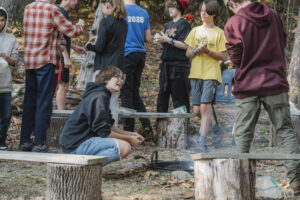
The World Civilizations course is the introductory social studies course at the high school level, primarily designed for the ninth grade year. The organizing theme to this course is an examination of the cognitive, agricultural, and scientific revolutions. Students explore the cultures and societies of prehistoric times, the river valley civilizations, and a variety of early empires such as the Mayans, Greeks, Romans, and Songhai. Throughout their study of the past, students also reflect on and analyze connections to the present, including the advances that led human society into the modern era. In addition to the skills and content specific to the area of social studies, two of TA’s transferable skills will be a key focus of the class: a) informed and integrated thinking, and b) effective communication and expression. Students will have multiple writing assignments throughout the course, including a culminating research project. This course includes an embedded honors option.
United States History
Grade 10 (Required) | Credit: 1
This course offers a thematic approach to studying US History in the time frame from colonization through the Great Depression. Themes we will examine include American Democracy, Immigration and Migration, The Economy, Labor and Reform, Struggles for Equality, and Imperialism and War. In studying these topics students will be asked to read a variety of primary and secondary sources. The first half of the course will be dedicated to learning strategies for reading historical texts and focusing on the components of research paper writing. All of these skills will then be used in writing a major research paper during the second half of the course. This course includes an embedded honors option.
Modern World History
Grade 11–12 (Required) | Credit: 1
This course explores the world region by region. In each region, students will study the culture, religion, and history of the area from 1900 to the present. Students will conduct in-depth research on how economics, religion, social conduct, and politics shape and influence culture. Each unit will begin with geography, followed by culture and religion, and will conclude with the history of the region starting in 1900. There is a strong emphasis on current events and connecting them to the past. This course includes an embedded honors option.
SOCIAL STUDIES ELECTIVE COURSES
Economics—Honors
Grade 11–12 | Credit: 1
This course is an introduction to economics, covering fundamental economics concepts, as well as topics in micro and macroeconomics. These topics include, but are not limited to, scarcity and choice, opportunity cost, markets, prices, supply and demand, gross domestic product, aggregate supply and demand, unemployment and inflation. Additionally, the course will discuss the application of these concepts through the lens of labor and environmental economics.
Social Justice in Action
Grade 9-10 | Credit: 1/2
This project based course is designed to introduce students to social justice issues and assist them in discovering their ability to create positive change in their own world. Students will critically analyze various social movements related to race, ethnicity, gender, sexual orientation, and class. Students will also explore and discuss how these concepts influence human understanding, relationships, and behavior. The course will be devoted both to learning about social constructs and movements, and influencing change by designing and implementing a social justice action project within their own community or framework.
Civics
Grade 11-12 | Credit: 1/2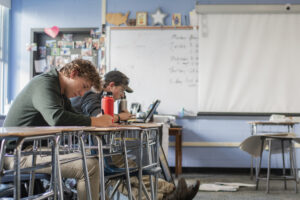
Learning about civics gives students the skills and knowledge necessary to be active citizens who have a positive impact on their communities. In this course, students discover the rights and responsibilities of citizenship in the United States. This course is designed to provide students with a practical knowledge and understanding of the study of the American government, and its direct connection to its citizens. Students will be able to apply knowledge of the US Constitution and demonstrate their understanding of how the American system of government functions on the local, state and national levels, as well as the impact on individual citizens. Students will also be able to demonstrate their understanding that US citizens have both rights and responsibilities in order for our government to maintain order in our society.
Psychology
Grade 11–12 | Credit: 1
Why do people do the things they do? What does it mean to be “normal”? How do we learn and remember? What does it mean to think and feel, and how do we know? People have pondered these questions for ages, and the field of psychology provides the tools to search for answers. In this upper level course, students will rely heavily upon primary sources, small group work, independent research, and student presentations, as they explore such topics as personality theories, biopsychology, cognition, sensation, emotions, states of consciousness, abnormal psychology, and the interface between psychology and the law.
World Languages
By interweaving language and culture, TA’s World Languages program helps students develop linguistic proficiency and broaden cultural sensitivity. The curriculum adheres to the “5 Cs” of the National Standards for Foreign Language: communication, cultures, connection, comparisons, and communities. At the end of a three or four-year sequence of French or Spanish, students will be able to enjoy communicating with a native speaker about most aspects of daily life, express opinions, and discuss a variety of cultural subjects, including interpretation and analysis of music, poetry, art, and literature.
Thetford Academy strongly encourages college-bound students to take at least three courses of the same language in high school; four or five courses are preferred.
MIDDLE SCHOOL PROGRAM
French I | Spanish I
Grade 7–8 | strongly recommended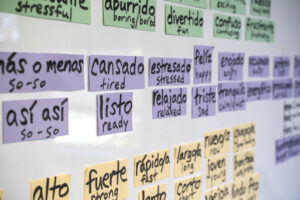
Middle School languages teach students the skills to be successful language learners, and places importance on projects, interactive games, and activities. TA offers French I and Spanish I as a two-year program in middle school. Students may start language studies as 7th graders and continue in 8th grade, covering the equivalent of a French I or Spanish I course in two full years of study. To successfully advance to the second level in the 9th grade, students must complete both years successfully.
FRENCH PROGRAM
French I
Grade 9–12 | Credit: 1
This course is an introduction to the study of French and the French-speaking world and helps students establish a solid foundation for more advanced study, travel, and intercultural communication. Students focus on building their vocabulary, practicing reading, listening, writing and speaking skills, and strengthening their cultural awareness. Topics such as contemporary life, family and community, and personal and public identities are explored through a variety of engaging activities such as games, interviews, projects, storytelling, and discussions about films, videos, music and art.
French II
Grade 9–12 | Credit: 1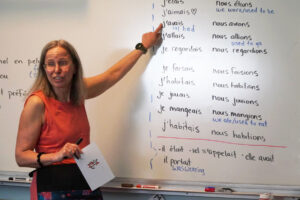
This course builds on the work accomplished in French I. Students continue to expand their vocabulary and cultural awareness and improve their reading and listening skills as they begin to shift their focus to further development of their writing and speaking skills. Students in this course focus on practicing language functions such as asking and answering questions, describing, expressing opinions and preferences, narrating events, and maintaining conversations and discussions. Class activities center on literature, film, music, art, and other media.
Prerequisite: Demonstrated proficiency in French I or permission of the instructor.
French III
Grade 10–12 | Credit: 1
This course continues the work accomplished in French II. Students are expected to produce more language at a more advanced level. Students in this course focus on continuing to expand and improve overarching language functions like asking and answering questions, describing, expressing opinions and preferences, narrating events, and maintaining conversations and discussions within a broad range of themes such as personal and public identities, families and communities, global challenges, contemporary life, and beauty and aesthetics. Class activities center on literature, film, music, art, and other media.
Prerequisite: Demonstrated proficiency in French II or permission of the instructor.
French IV/V—Honors Course
Grade 11–12 | Credit: 1
French IV/V Honors is intended for students who have a fundamental knowledge of the language and culture of the francophone world. This is an advanced course conducted entirely in French, designed to develop students’ fluency of communication with greater accuracy. Students will develop their proficiency in listening, speaking, reading and writing while deepening their insight into francophone cultures around the world. Course content alternates between odd and even school years based on the interests of the students, and to allow students to explore different material and new experiences as they are promoted from level IV to V. Class activities continue to center on literature, film, music, art, and other media in the context of a broad range of themes such as personal and public identities, families and communities, global challenges, contemporary life, and beauty and aesthetics.
Prerequisite: Demonstrated proficiency in French III or permission of the instructor.
SPANISH PROGRAM
The World Languages department believes that students of Spanish should be equally proficient in the four communication skills: listening, speaking, reading, and writing. The Spanish program emphasizes each of these skills throughout the curriculum. At the end of a three or four-year sequence, the student will be able to communicate with a native speaker about most aspects of daily life, express opinions, and discuss a variety of subjects including interpretation and analysis of music, poetry, art, and literature. The program offers a communicative, whole language approach.
Spanish I
Grade 9–12 | Credit: 1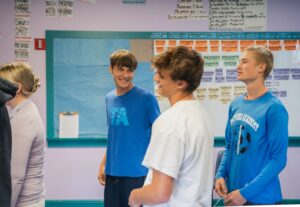
This course is an introduction to the study of Spanish and the Spanish-speaking world and helps students establish a solid foundation for more advanced study, travel, and intercultural communication. Students focus on building their vocabulary, practicing reading, listening, writing and speaking skills, and strengthening their cultural awareness. Topics such as contemporary life, family and community, and personal and public identities are explored through a variety of engaging activities such as games, interviews, projects, storytelling, and discussions about films, videos, music and art.
Spanish II
Grade 9–12 | Credit: 1
This course continues the work accomplished in Spanish I. Students continue to expand their vocabulary and cultural awareness and improve their reading and listening skills while beginning to shift their focus to the further development of their writing and speaking skills. Students in this course focus on practicing language functions such as asking and answering questions, describing, expressing opinions and preferences, narrating events, and maintaining conversations and discussions. Class activities center on literature, film, music, art, and other media.
Prerequisite: Demonstrated proficiency in Spanish I or permission of the instructor.
Spanish III
Grade 10–12 | Credit: 1
This course continues the work accomplished in Spanish II. Students are expected to produce more language at a more advanced level. Students in this course focus on continuing to expand and improve overarching language functions like asking and answering questions, describing, expressing opinions and preferences, narrating events, and maintaining conversations and discussions within a broad range of themes such as personal and public identities, families and communities, global challenges, contemporary life, and beauty and aesthetics. Class activities center on literature, film, music, art, and other media.
Prerequisite: Demonstrated proficiency in Spanish II or permission of the instructor.
Spanish IV/V—Honors
Grade 11–12 | Credit: 1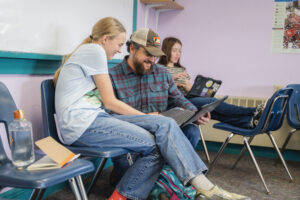
Spanish IV/V Honors is intended for students who already have a fundamental knowledge of the language and culture of the Spanish-speaking world. This is an advanced course conducted entirely in Spanish, designed to develop fluency of communication with increased linguistic accuracy. Students will develop greater proficiency in the four language skills (listening, speaking, reading and writing) while deepening insight into Spanish-speaking culture. Each semester is planned to alternate so that students can explore different material and new experiences as they are promoted from level IV to V. Some examples of topics covered in the course include current and historical events, influential figures, themes of identity in the Americas, immigration, social justice, and music of the Hispanic world.
Prerequisite: Demonstrated proficiency in Spanish III or permission of the instructor.
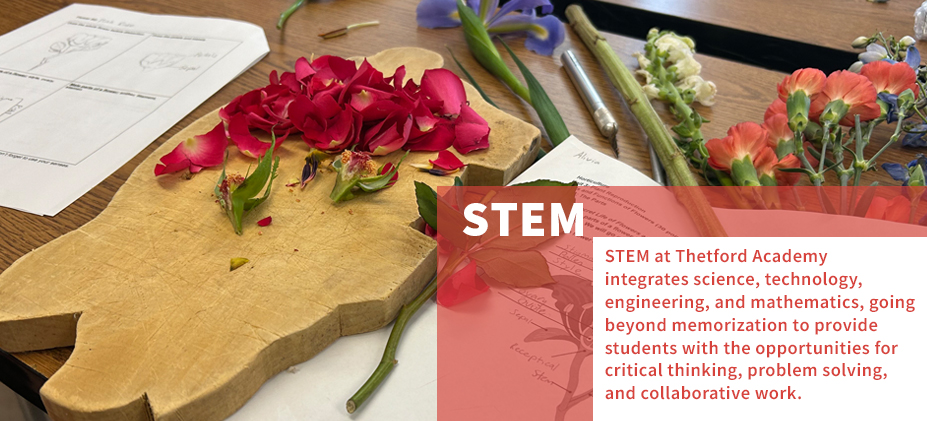
Mathematics
The Mathematics Department provides multiple entry points and pathways for students to progress in their mathematical competency. The math curriculum at TA is informed by the Common Core standards and the Vermont Framework in curricular content and learning opportunities, particularly the standards for mathematical understanding, problem-solving, and systems.
Graduation Requirements and Course Selection:
At least three credits of high school mathematics are required for graduation, with Algebra I recommended as one of the three courses. All students interested in pursuing a STEM field should consider taking two years of Algebra, one year of Geometry, and an advanced mathematics course. Students are required to earn two of their math credits at Thetford Academy; for students pursuing a technical program with an embedded math credit, one mathematics credit from the tech center can be counted toward the graduation requirement.
Course Credit Regulations:
Students who wish to take two mathematics courses in one school year may do so if they have met the prerequisite requirements for the second course and there is room available in the class. If a course is offered at TA and a student takes an equivalent course elsewhere, the student must take the Thetford Academy math course exam and receive at least 85% on the exam for the course to serve as the appropriate prerequisite.
Math I
Grade 7–8 | Required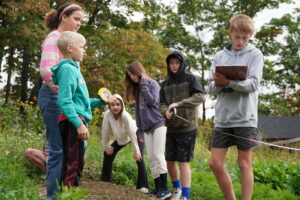
Math 1 strengthens students’ understanding of basic math concepts such as decimals, fractions, percents and problem solving. The course prepares students for Math II or Concepts.
Math II
Grade 7–8 | Required
Math II solidifies students’ understanding and application of decimals, fractions, integers, percents, and problems solving. It also begins an exploration into proportional reasoning. The course prepares students for Math III or Pre-Algebra.
Math III
Grade 7–8 | Required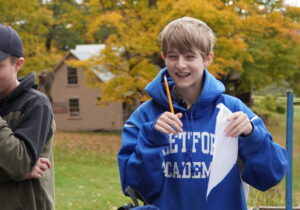
Math III builds on the discovery-based problem-solving and critical thinking done in Math I and Math II, preparing students for Algebra 1. Topics include evaluating expressions, fractions, ratios, proportions, percents, and introductory geometry. The main area of focus is solving one-variable equations and graphing linear equations. Students need a firm grasp of integer and basic operations to be successful in this course.
Math Concepts
Grade 9–12 | Credit: 1
Math Concepts is a small-group, individualized class, with a curriculum designed for students who need instruction in the foundations of mathematics.
Prerequisite: Placement in this course requires consultation with a school counselor and the math department.
Consumer Math
Grade 11–12 | Credit: 1
Consumer Math is a small-group, individualized class focusing on the application of mathematical concepts to life skills such as balancing checkbooks, managing expenses, being a savvy consumer, and understanding product discounts.
Prerequisite: Placement in this course requires consultation with a school counselor and the math department.
Pre-Algebra
Grade 9–10 | Credit: 1
Pre-Algebra bridges the gap between basic mathematical functions and algebraic thinking. The focus is on building a strong foundation as students prepare to move forward to Algebra I, Applied Mathematics, or Personal Finance. Topics include evaluating expressions, fractions, ratios, proportions, percents, and introductory geometry. The main area of focus is solving one variable equations and graphing linear equations. Students need a firm grasp of integer and basic operations to be successful in this course.
Prerequisite: Successful completion (C or above) of Math II or equivalent, or permission of the instructor.
Algebra I
Grade 9–12 | Credit: 1
Grade 8 | Instructor permission required
Algebraic thinking is the stepping stone to higher level mathematics. The course begins with a thorough review of the concepts essential to success in Algebra—the order of operations, operations with signed numbers, and the distributive property—and moves on to solving and graphing, linear and quadratic equations and inequalities. In addition, students study factoring, simplifying and manipulating rational expressions, and linear functions. The course includes an emphasis on collaborative problem-solving. This course includes an embedded honors option.
Prerequisite: Successful completion (B or above) of Math III or Pre-Algebra, or permission of the instructor.
Algebra II
Grade 9–12 | Credit: 1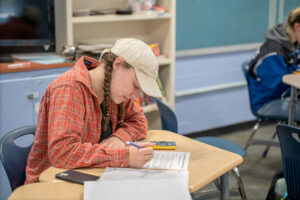
In this course, students study sequences, statistics, linear models and systems, functions, relations, and transformations. Problem solving and group work make up a large portion of the course. This course is designed for students who wish to develop their mathematical intuition by seeing how math works in real-life situations. It is excellent preparation for the social sciences such as psychology or sociology, and students would be well prepared to continue their study of math by enrolling next in the Statistics course.
Prerequisite: Successful completion (B or above) of Algebra I or permission of the instructor.
Note: Students must take Algebra II Honors before enrolling in Precalculus.
Algebra II—Honors
Grade 10–12 | Credit: 1
Algebra II Honors is an advanced mathematics course that helps students prepare for future mathematical study and STEM careers. The course expects students to have a very strong algebraic foundation, including excellent factoring skills. Units of study include matrices, trigonometry, functions, and square roots of both real and imaginary numbers. Graphing various forms of equations and inequalities is an integral part of the course. Students are asked to think critically throughout Algebra II Honors by explaining, justifying, verifying, interpreting, drawing, and labeling mathematical relationships.
Prerequisite: Successful completion (B or above) of the embedded honors option in Algebra I or permission of the instructor.
Geometry
Grade 9–12 | Credit: 1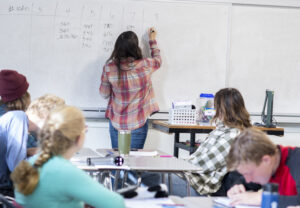
Geometry covers similarity, congruence, basic trigonometry, properties of geometric figures, transformations, and the geometry of solids. Deductive reasoning and developing mathematical arguments are a central focus. This course is discovery-based and focuses on applications. This course includes an embedded honors option.
Prerequisite: Successful completion (B or above) of Algebra I, Algebra II Honors or Algebra II, or permission of the instructor.
Applied Mathematics
Grade 11–12 | Credit: 1
This course surveys various mathematical contexts through the lens of everyday use. Topics may include carpentry, home budgeting, the mathematics of voting, the geometry of art, and automotive applications. Applied Math is offered for students who have not yet taken Algebra I or Algebra I Honors.
Prerequisite: Successful completion of Pre-Algebra or permission of the instructor.
Personal Finance
Grade 11–12 | Credit: 1
This course reviews foundational mathematical skills to navigate common financial topics in the business world and in one’s personal life. Units of study include types of wage payments, taxes, loans, saving and investing options, insurance, and household expenses.
Statistics
Grade 11–12 | Credit: 1
Statistical analysis is the basis of many areas of study. Most college-level students will study some level of statistics to prepare them for their future careers. This course provides a good background preparation for that study. Students learn about data collecting techniques, data analysis, measures of central tendency, and probability. Computer applications and calculators are used throughout the course.
Prerequisite: Successful completion (C or above) of Algebra II and Geometry, or permission of the instructor.
Precalculus—Honors
Grade 11–12 | Credit: 1
This course provides preparation for calculus through detailed study of the elementary functions. Topics of study include an introduction to functions and their algebraic properties and in-depth analysis of a variety of elementary functions. Trigonometric, exponential, logarithmic and polynomial functions are included, with other topics selected by the instructor.
Prerequisite: Successful completion (B or above) of Algebra II Honors and Geometry, or permission of the Algebra II instructor.
Calculus—Honors
Grade 11–12 | Credit: 1
This course is an entry-level survey of the topics of the calculus of one variable, and includes applications from both differential and integral calculus. While emphasis is on skills, the course also covers the theoretical foundations of these topics.
Prerequisite: Successful completion (B or above) of Precalculus or permission of Precalculus instructor.
Science
The Science Department at TA helps students acquire essential knowledge in the physical, life, and chemical sciences. By engaging in the authentic practice of science, students will learn about the relationships among science, technology, and human activity and how they affect the world.
Students will learn to:
- Acquire, classify, and utilize scientific knowledge;
- Understand basic scientific methods and principles;
- Understand and apply safe lab techniques;
- Demonstrate proper use and care of laboratory equipment; and;
- Be environmentally aware.
To fulfill the Science diploma requirements of Thetford Academy, a student must complete three credits of coursework from the Science Department, including Conceptual Physical Science and Biology.
SCIENCE REQUIRED COURSES
Science 7: Introduction to Laboratory Science
Grade 7 | Required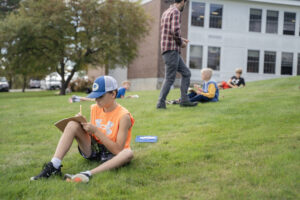
This course introduces students to laboratory science through a variety of subjects and experiences. Students will have an opportunity to design experiments, complete engineering and design challenges, collect and record data, interpret results and communicate findings using scientific writing. Students will engage in units that cover topics related to matter and its interactions, meteorology, climate change and human impact on our environment, genetics, human body systems and cell structure and function. This course will use our outdoor resources for the purpose of learning as much as possible.
Science 8: The Flow of Matter and Energy through the Biosphere
Grade 8 | Required
This course explores the transfer of matter and energy through ecosystems on both local and global scales, with a primary focus on designing experiments and developing models. The forest serves as the classroom, where students will refine their skills in observation, inquiry, discovery, and explanation. At the global level, the course covers the biosphere, atmosphere, hydrosphere, and geosphere, examining how matter and energy flow between these systems. Students will engage in questions such as: What organisms inhabit this area? What types of rocks are present, and how did they form? How do leaves interact with the atmosphere and hydrosphere? In what ways do mountains influence climate? How do organisms adapt to different biomes? How does heat transfer between objects? What factors are contributing to climate change? Throughout the course, students will develop the ability to pose scientific questions, conduct experiments to test hypotheses, and use models to explain complex phenomena.
Conceptual Physical Science
Grade 9 (Required) | Credit: 1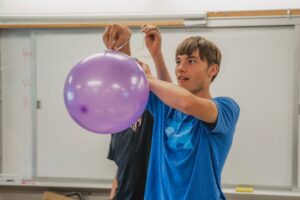
Conceptual Physical Science (CPS) is a laboratory-based introduction to the physical sciences for students in the 9th grade. This course emphasizes topics in physics and chemistry as well as lab work. Units of study will include motion and forces, energy, work, heat and states of matter, as well as the structure of the atom, chemical bonding, the periodic table of elements and astronomy. In addition to individual and group research projects and labs, students are challenged to complete engineering design projects. This course includes an embedded honors option.
Essentials of Biology
Grade 10 (Required) | Credit: 1
Are viruses alive? If human mass is mostly bacterial cells, who is running the show? If the mushroom on the forest floor is not a fungus organism, what is? This introductory course answers these and other questions and helps students relate modern biology to our ever-changing world. Topics of study include ecology, cell biology, biochemistry, genetics, evolution, and classification. The course includes a variety of labs and hands-on field explorations designed to further understanding of the scientific method. This course includes an embedded honors option.
SCIENCE ELECTIVE COURSES
Advanced Biology—Honors
Grade 11–12 | Credit: 1
Honors Biology immerses students in study of the biological processes that control and regulate all life. Looking at DNA as life’s “blueprint,” students explore DNA’s role and use as a delivery device for the biological information that drives evolution, as well as its role in medicine, industry, and forensic science. Students engage in a series of labs and independent projects to prepare themselves for college-level work in science, biology, or a health-related field of study.
Prerequisite: Essentials of Biology or permission of the instructor.
Food Science
Grade 9–12 | Credit: ½ or 1
The Food Science course uses common food ingredients to explore scientific concepts. Throughout the course, students will participate in laboratory food experiments, using the scientific method to explore science concepts. Cooking offers ample opportunities to investigate chemical and physical changes, acid and base reactions, phase changes, heat transfer and more. For example, jams, pickles, beef jerky, ice cream, and bread all offer a platform to study science. Lab reports, including observations, data calculations and conclusions allow students to reflect on scientific concepts while developing critical thinking and reporting skills. After successfully completing Food Science students will have an introductory understanding of basic chemistry.
Chemistry
Grade 11–12 | Credit: 1
Chemistry is the study of matter and its changes. In this class, students learn how all matter in the known universe is derived from arrangements of the fundamental elements on the periodic table, and how they themselves and all that sustains them are made of those elements. Students study the building blocks of matter, how humans have come to understand them, and how to predict their interactions and create new forms of matter, in the context of ‘real world’ applications. Emphasis is placed on scientific reasoning, creating and evaluating models, and problem-solving skills.
Prerequisite: Essentials of Biology and Algebra II (concurrent enrollment permitted).
Advanced Chemistry—Honors
Grade 11–12 | Credit: 1
Students delve into the part of chemistry involving calculating amounts—how much solid is produced? How much heat is given off? Topics include modern atomic theory, stoichiometry, gas laws, thermochemistry, liquids and solids, and molecular structure. Students learn to write chemical formulas and reactions, analyze how fast reactions proceed and look at a special class of reactions that go forward and backward at the same time. This course is the essential next step for those students who are interested in pursuing a career in medicine or another STEM field. This course is also available for Dual Enrollment for college credit through CCV.
Prerequisite: Successful completion of TA Chemistry (B or above). Algebra II and other ongoing preparation in mathematics are recommended.
Marine Biology
Grade 11–12 | Credit: 1
The oceans contain some of Earth’s most beloved creatures along with some great alien mysteries. The blue whale may be the largest animal to have ever existed on Earth, yet it is the tiny plankton that make the greatest mass migration of any organism on land or sea. This course covers the biology of organisms in various marine habitats as well as the abiotic (non-living) factors that define those habitats. Along the way, the class will learn about the international laws governing marine management and explore a variety of conservation issues.
Forestry
Grade 11–12 | Credit: 1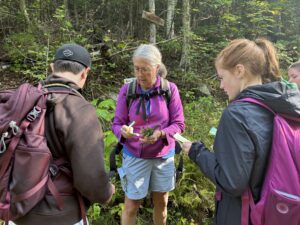
This class examines forests from both local and global perspectives, utilizing TA’s extensive outdoor resources. The semester begins with learning to identify trees, a skill that will later be applied to interpreting the forested landscape. The primary textbook is Reading the Forested Landscape by Tom Wessels. Students will spend nearly every day outdoors, exploring how factors such as soils, topography, succession, climate, wildlife, and wildfire influence forest growth. They will seek out clues in the current forest that reveal a history spanning hundreds of years. The course also covers how foresters collaborate with landowners to survey forests and develop management plans. Each student will demonstrate their forestry skills by selecting a location in the TA woodlot to evaluate. As the weather cools, the class will explore how Vermont’s forests are adapted to winter and contrast this with a detailed study of tropical forest ecosystems. This course includes an embedded honors option.
Horticulture
Grade 10–12 | Credit: 1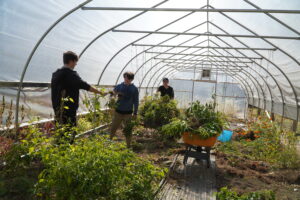
Horticulture is all about growing! This is an introductory course in applied science designed for the student who enjoys getting their hands dirty and watching things grow. This course covers a range of principles and practices of plant growing methods. Topics in soil health, ecological practices, plant genetics, and horticultural technology are also included. Are you curious and excited to learn outside? This course will benefit any plant enthusiast or budding gardener, whether you’re interested in ornamentals, fruits, or vegetables. A cooperative ‘can-do’ attitude and enthusiasm to participate in outdoor hands-on work is expected daily.
Physics: Mechanics
Grade 11–12 | Credit: 1
If something moves, it can be studied-falling objects, rockets launching into space, or cars racing around a track. In this course, students analyze the motion of objects through a variety of perspectives starting with simple motion in one dimension and ending with investigations of momentum and energy. An emphasis is placed on mathematical application to real world scenarios, therefore a strong background in algebra and basic trigonometry is very helpful for this course.
Prerequisite: Algebra II (can be taken concurrently).
Physics: Waves
Grade 11–12 | Credit: 1
A bobbing spring or a swinging pendulum begins a study of waves, which then leads to a study of sound, including the basics of music and musical instruments. Students will then apply these concepts to a study of electrical current and magnetism. This leads naturally into electromagnetic waves and optics. Laboratory assignments will emphasize experiments and projects that allow students to explore each of the topics in depth and allow them to further improve their scientific communication skills.
Prerequisite: Algebra II (can be taken concurrently).
Engineering and Technology
Engineering and technology skills are critical in today’s world. Beginning in grades 7 and 8, Thetford Academy students learn how to be good digital citizens and use technology safely and responsibly. In high school, students can take advantage of courses in the growing fields of robotics, cybersecurity, high-tech manufacturing, and computer science.
Middle School Digital Literacy
Grade 7 | Required
In Digital Literacy, students explore what it means to be a digital citizen, expand their understanding of how digital networks and computers operate, and practice using digital tools to learn and create. The class is designed to help students become capable and thoughtful users of technology. Students will find out how long it takes a web packet to travel from Los Angeles to London, make a plan for combating cyberbullying, and learn how to spot an online scam. They’ll discuss subjects such as what information should be kept private and explore some of the ways online companies use data you give them. Once a week, students will spend the class creating with technology: building websites, editing images, creating 3-D models, coding games, animating movies, and more.
STEM Internship with Hypertherm and Fujifilm Dimatix
Grade 11–12 | Credit: See below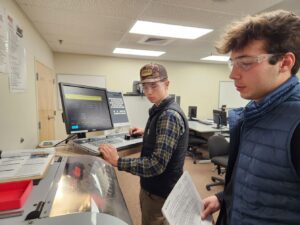
The STEM Internship is a fall semester program for juniors and seniors that engages students in a real-world exploration of advanced manufacturing and the inner workings of a successful business. In partnership with local companies Hypertherm and Fuji/Dimatix, this innovative learning experience takes place primarily at the companies’ headquarters.
Note: Participating students will receive one Math credit, one-half Science credit, and one-half Elective credit.
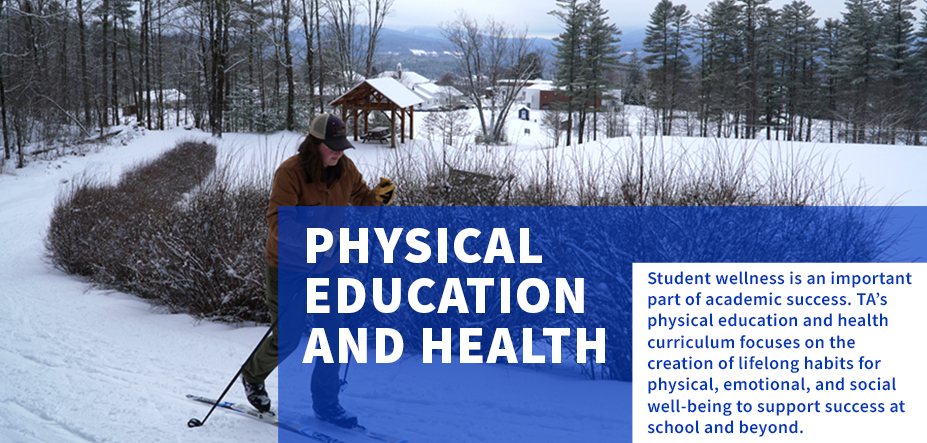
PHYSICAL EDUCATION AND HEALTH REQUIRED COURSES
Middle School Physical Education
Grade 7-8 | Required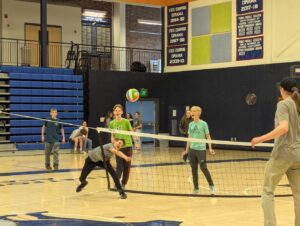
Middle school students combine into four sections for Physical Education (PE) classes. The Middle School PE program focuses on developing fundamental skills, building knowledge, and fostering group cohesion. Students participate in a variety of activities, including net games, team sports, individual sports, fitness exercises, team-building activities, and recreational games. In addition, middle school students take part in a three-week health unit that focuses on sexual education and sexual health, providing them with essential knowledge and skills to make informed and responsible decisions.
Health
Grade 10 (Required) | Credit: 1/2
Health Education emphasizes the development of essential health skills while building or reinforcing functional knowledge. The primary goal is to provide students with practical opportunities to practice these skills, empowering them to make informed, health-enhancing decisions in their daily lives. The curriculum covers a wide range of topics, including: Introduction to Health and Wellness, Nutrition and Healthy Eating, Substance Use Prevention and Awareness, Sexual Health and Relationships, Mental and Emotional Health, and Personal Health Advocacy. Through engaging activities, discussions, and skill-building exercises, students will explore how to apply their learning to promote holistic well-being and advocate for their personal health goals.
PHYSICAL EDUCATION ELECTIVE COURSES
Lifelong Activities: Individual and Team Sports
Grade 9–12 | Credit: 1/2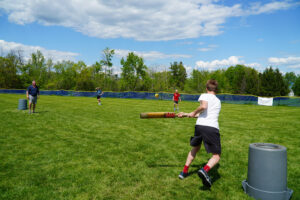
Lifelong Activities is an engaging physical education course that inspires students and fosters lifelong fitness habits. Through diverse activities like flag football, archery, soccer, ultimate frisbee, disc golf, basketball, badminton, pickleball, volleyball, nitro ball, team handball, indoor soccer, and a fitness unit, students develop motor skills, enhance coordination, and build overall fitness. The course emphasizes personal growth, teamwork, and social interaction, helping students build positive peer relationships and vital skills for team and individual sports. Additionally, the curriculum promotes mental and emotional well-being by teaching students the connection between physical activity and a healthy lifestyle. Activities are inclusive and adaptable, ensuring all students participate, improve, and thrive in both fall and spring semesters.
Personal Fitness & Wellness
Grade 9–12 | Credit: 1/2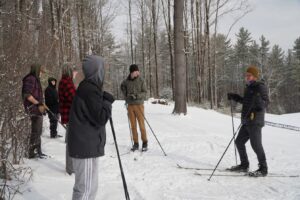
This course is designed to incorporate opportunities to practice physically health-enhancing activities, including muscle strengthening, flexibility, and cardiovascular fitness. Additionally, we will explore various outdoor recreation opportunities. This holistic approach supports students in developing a comprehensive understanding of physical wellness, equipping them with lifelong skills to maintain a healthy and active lifestyle.
Yoga and Mindfulness
Grade 9–12 | Credit: 1/2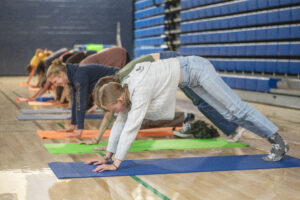
Finding personal balance in a busy life is important for everyone. The practice of yoga and mindfulness can be powerful tools every student can learn and practice as lifelong skills. It can also help them achieve balance during the school day and beyond. This course focuses on teaching students to develop a stronger, more flexible body while learning and practicing breathing and relaxation techniques designed to manage stress.
Outdoor Stewardship
See Outdoor Education below for full description.
Environmental Studies and Outdoor Education
See Outdoor Education below for full description.
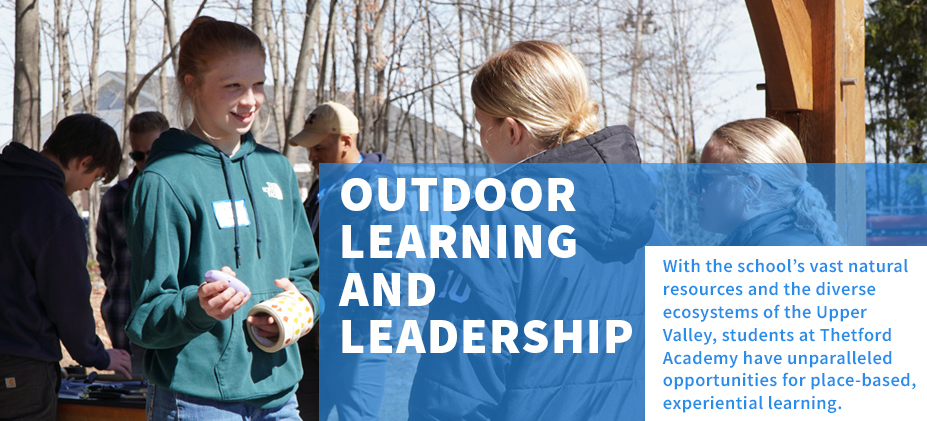
Middle School Outdoor Leadership
Grade 7–8 | Elective Rotation
This middle school elective focuses on introductory outdoor skills, leadership and collaboration, creative expression, and problem solving through the exploration of our outdoor spaces on campus. The themes vary each year, season, and quarter since students take this course in both 7th and 8th grade. Units and activities are often tied to the present season. Examples of units include winter wildlife tracking, tree identification, teambuilding on the low ropes course, shelter building, gardening/composting, and nature journaling.
Environmental Studies and Outdoor Education
Grade 10–12 | Credit: See below
Environmental Studies and Outdoor Education is a half-day, interdisciplinary course covering a wide range of topics with an emphasis on outdoor, experiential, self-directed, project-based learning, and recreation. Students will learn about forest ecology, carbon sequestration, maple sugaring, disc golf, teambuilding, trail maintenance, fluvial dynamics, self reliance, and creative writing. A variety of fiction and nonfiction texts will be covered. 80% of the class time will take place outside. Multiple field trips will take place to enhance learning. The curriculum takes advantage of Thetford Academy’s vast natural resources to educate the mind, body, and soul of each student. Students in the course will develop strong ecological literacy, a high level of physical fitness, and an understanding of their role in—and connection to—the natural world. Students interested in enrolling in this interdisciplinary course must apply, interview and provide a reference to demonstrate their readiness to take full advantage of the unique learning environment of this class and their ability to be a self-directed learner.
*Students can elect to add an embedded honors credit to the Science component of this course. This entails additional and amplified work on selected sections of the Science curriculum.
Note: The course involves embedded work in English, Physical Education and Science over two semesters (four blocks). Students enrolled for the full year will earn one Science credit, one English credit, one PE credit and one Elective credit. Students can enroll for one semester and receive one-half Science credit, one-half English credit, one-half PE credit and one-half Elective credit.
Outdoor Stewardship
Grade 9-12 | Credit: 1 (PE)
In this class students will develop physical and social health through outdoor recreation and stewardship of our school’s outdoor resources. The class will focus on becoming stewards of our land through project based learning including teambuilding, trail maintenance, outdoor games, disc golf course design and upkeep, working in the garden, maintaining our composting system, seasonal activities of maple sugaring, snowshoeing, cross country skiing and wilderness survival skills. This class will primarily take place outdoors unless the weather provides an element of danger. Students should expect to come to class prepared for all types of weather.
Forestry
Grade 11-12 | Credit: 1 (Science)
This class examines forests from both local and global perspectives, utilizing TA’s extensive outdoor resources. The semester begins with learning to identify trees, a skill that will later be applied to interpreting the forested landscape. The primary textbook is Reading the Forested Landscape by Tom Wessels. Students will spend nearly every day outdoors, exploring how factors such as soils, topography, succession, climate, wildlife, and wildfire influence forest growth. They will seek out clues in the current forest that reveal a history spanning hundreds of years. The course also covers how foresters collaborate with landowners to survey forests and develop management plans. Each student will demonstrate their forestry skills by selecting a location in the TA woodlot to evaluate. As the weather cools, the class will explore how Vermont’s forests are adapted to winter and contrast this with a detailed study of tropical forest ecosystems. This course includes an embedded honors option.
Horticulture
Grade 10–12 | Credit: 1 (Science)
Horticulture is all about growing! This is an introductory course in applied science designed for the student who enjoys getting their hands dirty and watching things grow. This course covers a range of principles and practices of plant growing methods. Topics in soil health, ecological practices, plant genetics, and horticultural technology are also included. Are you curious and excited to learn outside? This course will benefit any plant enthusiast or budding gardener, whether you’re interested in ornamentals, fruits, or vegetables. A cooperative ‘can-do’ attitude and enthusiasm to participate in outdoor hands-on work is expected daily.
Timber Framing
Grade 10–12 | Credit: 1 (Science)
Students collaborate to design a timber-framed structure, complete with a scale model, site plan, engineering calculations, brief environmental impact statement, timeline, and budget. They then cut the frame in the workshop, raise the frame on site, and contribute towards the completion of the structure. Readings, math work, and other traditional assignments supplement the hands-on learning. Homework may include spending time outside class hours contributing to the project after school or on weekends.
Cooking for Health
Grade 9–12 | Credit: 1
Cooking for Health is an experiential learning course. Students practice cooking skills and also take-on service learning projects. We begin the course in the school’s garden: harvesting, processing, and canning or freezing the produce. Students also enjoying these fresh whole foods making zucchini bread, carrot cake, or homemade spaghetti sauce. Other service learning targets food insecurity in our community. Projects include: offering a la carte items in the school cafe, food donations for the Thetford Food Shelf and the Thetford Elder Network and fundraising with the Empty Bowl Project. Cooking labs allow students to gain confidence in the kitchen and an opportunity to try meals made from scratch with whole ingredients that boost nutritional health.
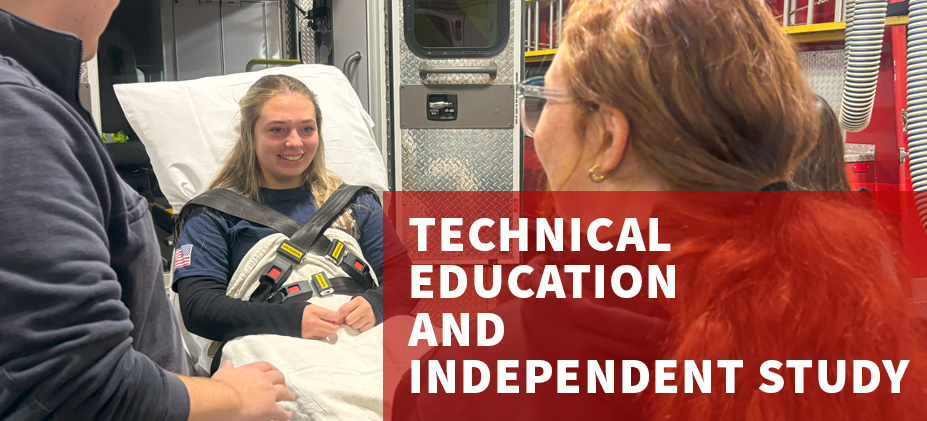
Independent Study
Challenge Course
Grade 10–12 | Credit: See below
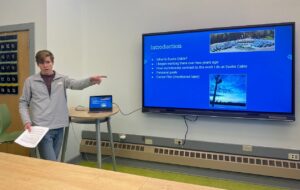 A Challenge Course gives students the opportunity to dive deeply into a topic of interest. Any topic not currently offered in TA’s curriculum will be considered for approval. Students design and plan their own course of study, while gaining experience in time and task management, project planning, self-direction, and effective communication. All Challenge Course students are required to give a final presentation about their project. Credit is awarded based on the number of hours completed.
A Challenge Course gives students the opportunity to dive deeply into a topic of interest. Any topic not currently offered in TA’s curriculum will be considered for approval. Students design and plan their own course of study, while gaining experience in time and task management, project planning, self-direction, and effective communication. All Challenge Course students are required to give a final presentation about their project. Credit is awarded based on the number of hours completed.
For more information, and to begin the process of writing a Challenge Course proposal, students should see their school counselor.
Technical Education
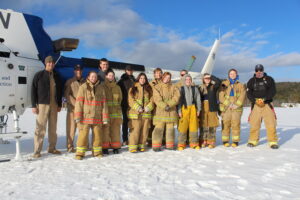
Thetford Academy partners with River Bend Career and Technical Center (RBCTC) and Hartford Area Career and Technology Center (HACTC) to offer technical education. TA juniors and seniors are eligible to apply for admission to all programs at River Bend Career and Technical Center or some programs at HACTC. Most courses are offered in a two-year sequence, with advanced work and specialization offered in the second year of study. Three credits are granted for successful completion of a one-year technical program.
All two-year programs offer one program-specific embedded credit toward graduation requirements in English, Science, Math, Art, or Social Studies. Upon successful completion of both years of a career program, students are eligible for six credits–five elective credits and one in the embedded academic area.
Technical programs available at River Bend Career and Technical Center include specialization in: 21st Century Media and Design, Automotive Technology, Heavy Equipment, Teacher Education, Culinary Arts, Diversified Agriculture and Natural Resources, among others. Visit the RBCTC website for more information about courses of study.



